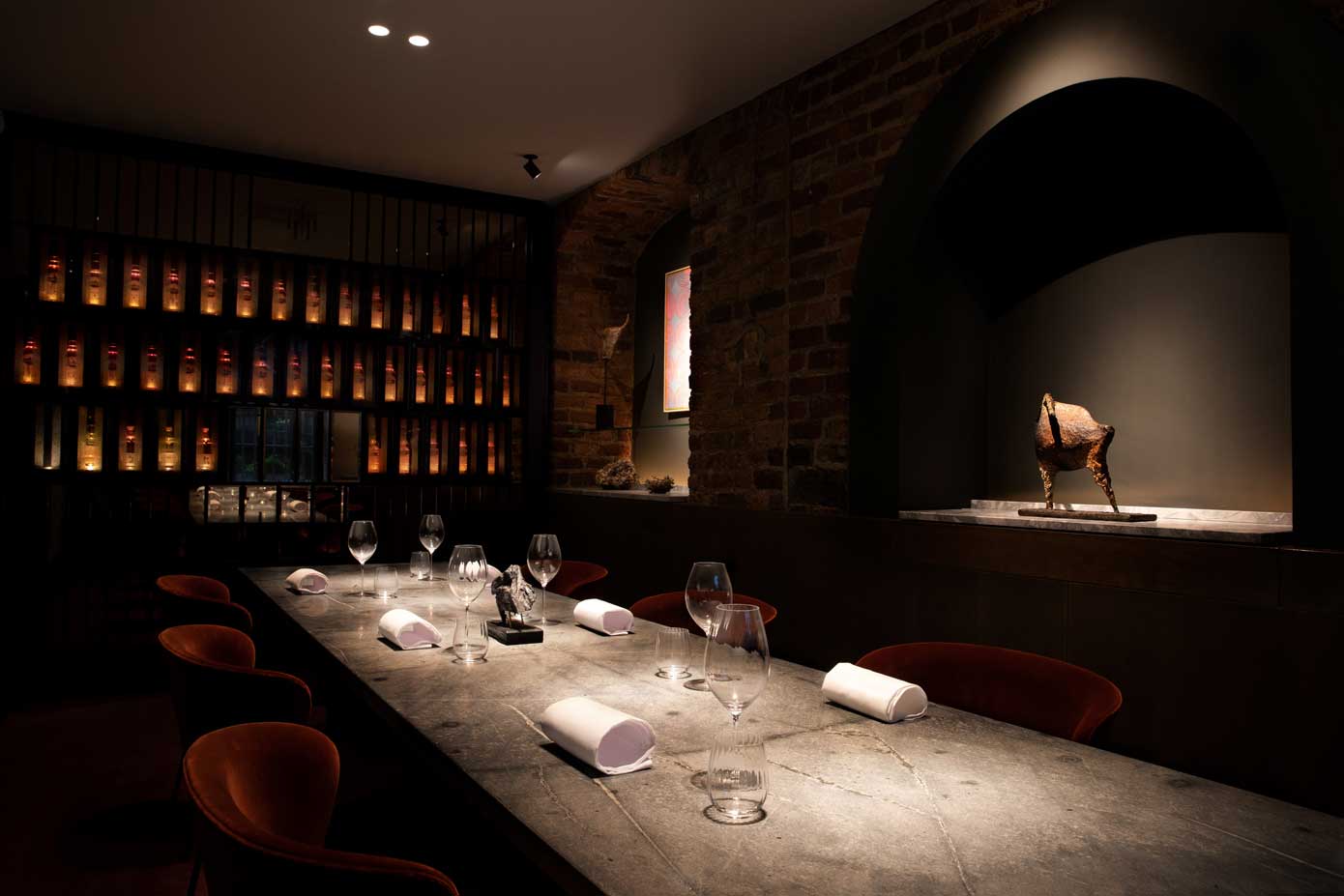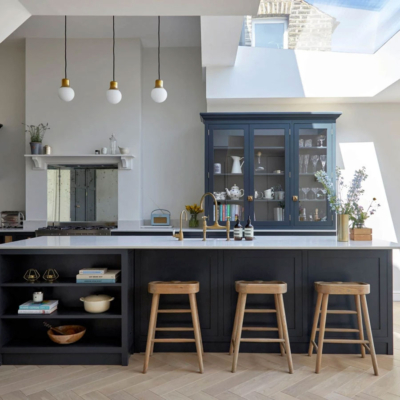After almost three decades at the helm of Chapter One, after gaining, and maintaining, a Michelin star, after years of food stardom, and personal sacrifice, Ross Lewis is beginning a new chapter in his life – and is very comfortable with it all, he tells Katy McGuinness. So where did it all begin? …
When you heard, this summer, the biggest Irish restaurant business bombshell to be dropped in years, you might have assumed that chef-patron Ross Lewis would be retiring when Finnish chef Mickael Viljanen, formerly of The Greenhouse, took over in the kitchen at Lewis’ Chapter One. It seems that nothing could be further from the truth.
After 28 years at the helm of one of Ireland’s best restaurants, where he held a Michelin star since 2007 and cooked dinner for a million people, Ross is currently cooking at Osteria Lucio, his Italian restaurant near Grand Canal Dock, enjoying the freedom of a more casual menu after the strictures of fine dining. “I’m giving the place a lick of Ross Lewis,” he says. “The pizzas are going nowhere but we’ve ordered new furniture and I’m bringing the food up a few notches.”
Ross grew up in Bishopstown in Cork, and went to secondary school with the Presentation Brothers on The Mardyke. His parents, Gethen and Margaret, are both Welsh, from farming backgrounds.
Gethen was the CEO of Pfizer Pharmaceutical, and Ross describes his mother as a great craftswoman, wedding cake maker and gardener. His brother Guy and sister Sallyanne still live in Co Cork.
The young Ross spent his childhood summers on his mother’s family farm in Wales, riding horses, collecting eggs, and helping in the piggery. “I understood the connection between agriculture and food from early on,” he says, “but if someone had said to me at 16 I’d be a chef for the rest of my life, I’d have said I had a better chance of going to the moon.”
In 1985, on graduating from UCC with a degree in Dairy Science, Ross headed to New York on a J1 visa. After stints as a baggage handler at JFK and up a ladder painting the New York Catholic Center, he ended up at Dorrian’s Red Hand on the tony Upper East Side.“I was a brutal waiter,” he remembers, “so they made me the bar manager. That was where I caught the bug. The catering business appeals to people who like a constantly changing background, who live for today. In Dorrian’s, the customers treated you so well, you felt you were part of something. I started growing up there, honing my social skills, learning to relate to people.”
After a year and a half, Ross returned home. “I realised there was no future for me in New York,” he says. “I was living the life, earning $1,200 or $1,400 a week, but my visa expired, I was illegal and had no bank account. After one hangover too many, I booked a flight home. I arrived back two stone heavier with nothing to show for myself but $1,000 in my wallet and three Dorrian’s T-shirts. My father was patient for a couple of weeks but then he came to my room one night and nearly poked holes in my chest, asking me what I was going to do with the rest of my life. I hadn’t even verbalised it to myself before but I said, ‘I’m going to own a restaurant, and I need to know the engine room, so I am going to go and learn how to cook.’ I was switched on enough to know you cannot be a restaurateur without understanding how it all works, but it was definitely the business side that appealed to me rather than the cooking.”
Ross got his first kitchen job at the plush Odin’s in Marylebone, London, then owned by Peter Langan and Michael Caine. “I found it fascinating,” recalls Ross. “The head chef was a nice guy, not too harsh. I’m not sure I would have survived otherwise. The problem with cooking when you start is you don’t have any sense of timing, and everything is three times more stressful than it should be because you are young and inexperienced. I was stuck on the veg section for a year and a half doing the same thing over and over again, then there was an opening on the starter section. That lit the fire again. You have to do your three years and earn your stripes but the hours are long, the work repetitive and for me it wasn’t going fast enough.” Initially Ross lived with his sister in St Albans. “I was getting up before I went to bed,” he says. “Then I lived in a couple of desperate bedsits; it was all a bit miserable.

Ross Lewis with wife Jessica and daughters Molly, Eabha and Sheana, photographed by Simon Watson.
“Then I did an assistant manager programme at the Dolphin Brasserie, and I started understanding the figures. It was very disciplined, they did a P&L every Sunday, and when I did eventually open my own place that stood to me, I was always acutely aware of figures.”
After London, Ross worked at the Chat-Botté in the upmarket Beau-Rivage on the Quai de Mont Blanc in Geneva, and then it was back to Dublin to collect a Donnelly Green Card en route to the US. But a delay saw him moving into a house on Lower Leeson Street with a crew that included journalist Matt Cooper. It was the summer of Italia 90 and, after a few weeks, Ross had decided that Dublin wouldn’t be a bad place to live after all. He took a front of house job at Peter Munnelly’s wine bar on Grafton Street, and then one in the kitchen of The Old Dublin, staying there until 1993.
“By then I was ready to go out on my own,” says Ross, “and Eamonn Walsh, who owned The Old Dublin, agreed to back me – and to allow Martin Corbett, the restaurant’s maitre d’, to come with me. The three of us were partners in the new venture.”
A basement under The Dublin Writers’ Museum in Parnell Square was not the most auspicious location for a smart restaurant, but Ross remembers the deal was too good to turn down as everything from the furniture to the tablecloths was included. “In my naivety I thought, ‘How could we fail?’ I was almost unaware of the location.”
Martin’s little black book proved to be key. “In those days it was all businessmen during the week, and birthdays and anniversaries at the weekend,” remembers Ross. “Tourism was done off a bus, and Martin knew the tour operators. So at 6pm each evening a tour bus would pull up outside and Martin would be there welcoming everyone with his customary enthusiasm. Fifty of them paid eleven quid a head for gravadlax, Chicken Kiev, dessert and a glass of wine, and they’d be back on the bus by 7.30pm. Then we’d be into the à la carte menu in the evening. We had a café and a banqueting room upstairs. Those kept us going; the restaurant would not have survived on its own. It was a hard slog, all about the fight to survive, but it was exhilarating for me to have five or six people working for me. Each year we did a little better.”
When a journalist came in for an early dinner and reported that the pre-show was better than the show at The Gate, it triggered a flood of bookings. Almost overnight, Chapter One’s pre-theatre menu was born. It went on to be a bedrock of the business.
“I’d describe the food in those days as Chapter One, very light,” says Ross. “I was involved in EuroToques [a grouping of chefs whose mission it is to preserve Irish culinary heritage by supporting traditional cooking methods and promoting producers of local and seasonal artisan products] and heavily influenced by Myrtle Allen. We were making efforts to find small producers but pre-internet it was really hard, and for almost 20 years I honestly thought it would never change, there was no political will, nothing to catalyse growth, no momentum. As a small island nation we were always looking to the outside for everything, in culture, art and architecture as well as in food. You could go to Clonakilty and not find Clonakilty black pudding on a restaurant menu, but you would never visit Parma and not find Parma ham. Chefs were mimicking French cuisine via London, then there was the awful mishmash of every cuisine, confusion fusion, spherification … But Rene Redzepi’s [of Noma] very natural approach changed everything, suddenly all the young chefs wanted to forage and source everything locally and thanks to the combined efforts of EuroToques, restaurateurs, the food press and consumers, the momentum did gather and Irish food culture grew from the bottom up rather than top down.”

Ross Lewis photographed by Simon Watson.
Ross’s wife Jessica was fundamental to the success of Chapter One. They met when she was an assistant manager at Conrad Gallagher’s Peacock Alley, having just returned from five years working in restaurants in Paris. “I pursued her for quite some time,” says Ross. “We married in 1999, and she came to work in Chapter One: you need people you can trust.” When Chapter One was awarded a Michelin star in 2007, it cemented the reputation of the restaurant, and the maturing of Ross as a chef. “I was 16 years trying to get the star,” says Ross, “and I got there by the aggregation of marginal gains. I was always aware it was a marathon not a sprint. I could have sped up the process by hiring better people earlier on rather than me running around like a fecking lunatic. It’s like a painter with a canvas, you spend years filling in colours and then when the penny drops you fill it in intelligently.
When the Michelin inspector walks into a restaurant there is a code – as soon as they look at a plate, before they even taste it, they have a fair idea as to what the chef is capable of, because they can see it. Then when they eat, they know.”
In 2011, Ross was chosen to cook for HM Queen Elizabeth at the State Banquet at Dublin Castle, and in 2019 took pride in being honoured by his alma mater, UCC, as one of five exceptional alumni. Most recently, Michelin awarded him its 2021 Chef Mentor Award in recognition of his work with chefs including Gareth Byrne at Campagne in Kilkenny, Damien Grey of Liath in Blackrock and Ahmet Dede of Dede in Baltimore, who have gone on to earn their own Michelin stars after working at Chapter One.
But after almost three decades in Parnell Square, the pandemic gave Ross time to think and reassess. “I had decided some time ago that mine was not the energy to make the next lift,” he says. “If you’re going to be at the top end of the market, it’s going to appeal to fewer people and be more expensive. What I did at Chapter One was run a one-star brasserie. We were never afraid of doing covers, we’d do 40 for pre-theatre and 70 for dinner, and lunches, day in day out. But I ran out of energy for that model, and I thought that if the business was to progress it had to pivot, and I didn’t think I had the mental energy for that. As you get older you think about the sacrifices you’ve made, and while I never minded putting my name on the roster and doing the hours, I did think about all the things I didn’t do, all the nights when I was working and my friends were doing other things, the invitations refused. For me and for my family, I decided a change needed to happen. Then it was a question of how does that happen? I wasn’t going to get much money if I simply closed down and put a for sale sign up outside a basement restaurant on the wrong side of the city, but there were few people who could take over completely, buy the business from me and allow me to exit. Mickael had the track record with two Michelin stars. He wanted to do his own thing, to invest and commit, and I wanted to divest, so that was how it started. He made his interest known.”

The private dining room at Chapter One.
“It took a long time to negotiate, but we both want the same thing and our ideas align. I will be there for some time helping and advising with the transition but I will not be in the kitchen, there’s no question of me nipping in a couple of mornings a week to make sure he’s on the right track!”
Initially, Jessica was shocked that Ross was considering a move away from Chapter One. “She said I would never do it, but when it became apparent I was taking it seriously, she said: ‘Are you sure? Are you doing the right thing?’ I had to believe I was. When you’re walking across the valley on the tightrope, you have to keep your eyes on the other side, you mustn’t look down. I did talk to three people in the industry I’m close to, and they were all positive … if they hadn’t been, I might have questioned the decision. I’ll still be part of it for the next couple of years, and in the long run I can be part of something that’s great but I don’t have to be flogging myself 17 hours a day. I’m bedding in the customers, working on training rosters, getting more involved in the wine list and tastings. I’m enjoying having time to spend enhancing the restaurant and improving the interiors. I love design. We commissioned a beautiful piece of furniture with a lovely stone top with a Gaggenau induction hob on it. The chefs are using it to finish some dishes in front of the customers and it brings a little bit of theatre to the dining room.”
Ross also has a Gaggenau kitchen at home; it got plenty of use during lockdown, when preparing meals with his three daughters became a daily ritual to which everyone could look forward. “Molly is a great cook, she’s in second year French and Business in Trinity, and Eabha will be starting college shortly, and Sheana is in third year in school,” says Ross. “We bought our house in 2001 and a few years later we built an extension and put in a Gaggenau kitchen with five gas rings, a teppanyaki grill and ovens. There’s not a bother on it; I think it’s bulletproof.
“During lockdown we had a great system going. I organised what we were going to eat and then one of the girls would prep, another would pick herbs and set the table, and another wash up as we went, so by the time we sat down that was all done. Sheana also helped me with the Good Grub project I was involved in, making cooking videos to go along with fruit and vegetable boxes being distributed to the families of pupils in Deis schools, and we had fun with that.”
Now that he’s back cooking at Osteria Lucio and ensuring a seamless regime change at Chapter One there is less time at home, but the newly achieved work life balance remains a priority.
LOVETHEGLOSS.IE?
Sign up to our MAILING LIST now for a roundup of the latest fashion, beauty, interiors and entertaining news from THE GLOSS MAGAZINE’s daily dispatches.









